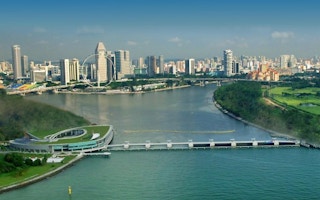John Poon, principal technologist at American engineering giant CH2M Hill, has more than 23 years of experience in water and wastewater engineering. He has completed projects for many Southeast Asian countries, India and Australia.
He is CH2M HILL’s regional technology leader for integrated water management and is currently leading the development of a water recycling strategy, feasibility study and implementation plan for India’s first large-scale advanced water recycling project.
He is a qualified National Recycled Water Auditor in Australia and was previously study manager for the Singapore government’s NEWater study.
Here, he speaks to Eco-Business on working towards a ‘water-centric city’ - the subject of a workshop he will be leading at the upcoming MIECF in Macao.
John Poon, principal technologist at American engineering giant CH2M Hill.
EB: How can we achieve or create a paradigm shift for more sustainable and effective integrated urban water management?
I do not think there is a single solution that fits all. But from what I have seen in this part of the world, here are some observations:
Firstly, defining the problem using sound science, engineering and evidence-based research is crucial. Without it, all we are doing is guess work, which always results in poorly conceived solutions and at times perverse outcomes for the environment, society and the economy.
Secondly, capacity building is an area that needs strengthening in the institutions that are responsible for management and planning of urban water supply systems.
Sound and modern practices in governance, leadership, management, regulation and compliance all need to be fostered, implemented and nurtured so that change can happen from within.
Thirdly, we need to educate stakeholders to understand their role in the water cycle and how it is not destroyed or created but rather continuously transformed.
Latest research into the acceptance of recycled water shows how such education help water managers and leaders to better engage with stakeholders and gain support at all levels of society for changes to the way we manage our finite water resources.
Lastly, monitoring and measurement is a must for not only identifying a problem but also measuring how solutions are performing and if corrections are needed.
Too often, we see solutions implemented but not backed up with any feedback on whether it is working. With the challenges of climate change and rapid urbanization in the region, the ability to monitor and measure performance becomes more and more critical. With modern IT, there is no excuse for poor data collection, management and analytics.
EB: In your experience, what are some of the obstacles cities face in achieving an effective, integrated water system?
Of the four elements I mentioned earlier, I think the one that is common to both western and eastern cities is governance.
Integrated water management covers pretty much everything related to the water cycle in a city, especially so if water is imported from another water basin or country. This poses a difficult challenge as it often leads to conflict via the courts or political means.
Without good leadership, capable people and sound governance, it is just about impossible to have a truly integrated urban water system.
EB: Are there any practical examples of countries or cities that are already successful in urban water management? What has enabled their success?
Singapore has had great success with integrated water management. When I first arrived in Singapore in 2000 to work on their Water Reclamation Study, little did I realize this would spur an era of water renaissance that is continuing today.
I cannot think of another city or country in the world that has embraced and implemented the key aspects of integrated urban water management the way Singapore has done. Many other places in the world speak about it but few bother to do concrete things. It is a great case study. Two big factors for success was good governance, capable people and some of the very first genuine efforts in educating people about water.
EB: How do you think policymakers can promote a more sustainable and resilient future for their cities in terms of planning urban water systems in tandem with infrastructure growth?
Very simple: Go and visit Singapore and see what they achieved within the space of a decade. They have been successful with making their urban water infrastructure more resilient, being able to meet the needs of the future, and at the same time, carrying the public and stakeholders along for the journey. It has been quite a demonstration of the four elements I spoke about earlier.
EB: Can you give us a sneak preview of your presentation at the upcoming 2013 MIECF? What can we look forward to?
I will speak about my experience in integrated urban water management in the region. Water recycling for drinking will be a feature. I will focus on examples and projects but will also provide some insights on public education, outreach and engagement. I feel it is important for the ‘technical people’ to know and learn how our actions influence the success of integrated urban water management solutions and projects.










